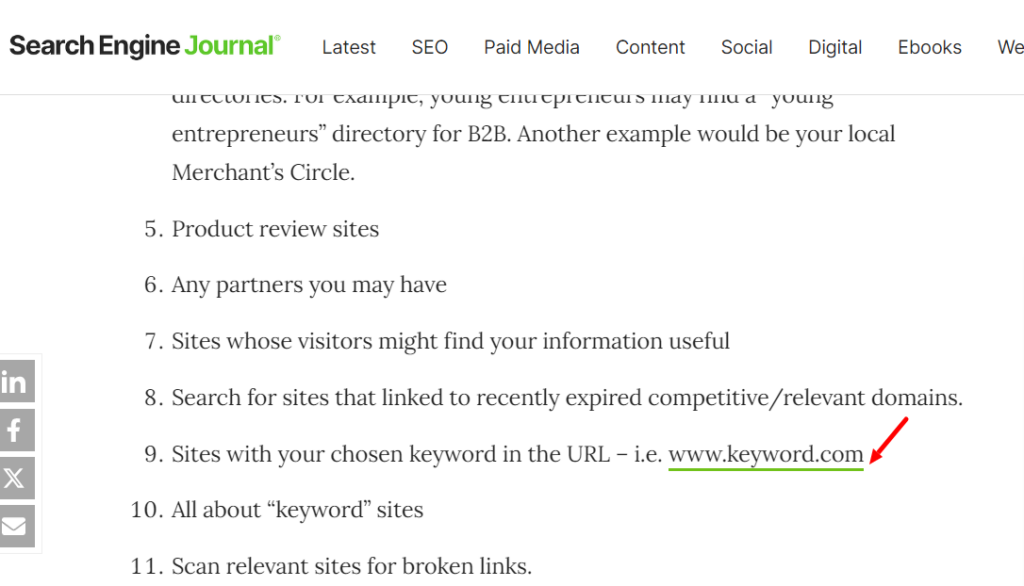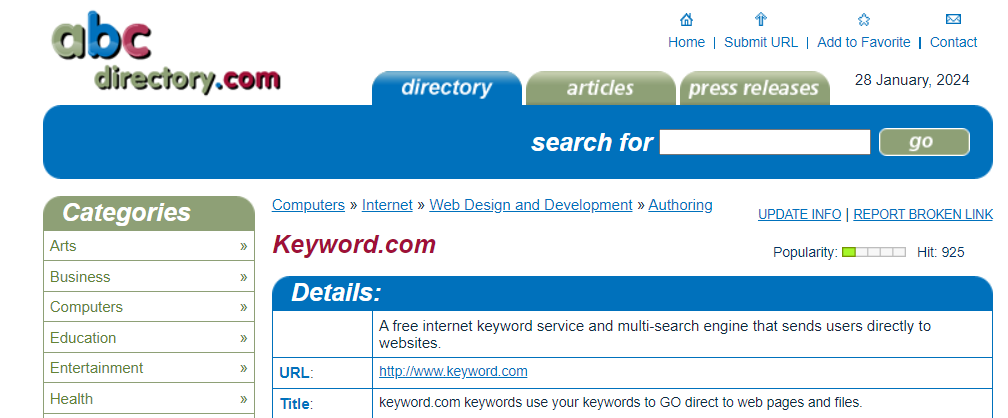Have you ever watched a tree grow from a tiny sapling to a robust, towering giant? It’s a slow yet sure process. In the SEO world, backlinks are like the rich soil that feeds the roots— the powerhouse driving organic search growth.
This article will explain how backlinks impact rankings, the meaning of backlinks, their types, and why they matter in SEO
Backlinks Explained: What Are Backlinks?
Backlinks, commonly known as inbound or external links, are links from other websites that lead to your own. Each backlink is a potential vote of confidence from other sites, signaling trust and authority to search algorithms.
Essentially, backlinks to your website are signals to search engines that other sites vouch for your content. If many sites link to the same webpage, search engines will realize that the content is worth linking to and, therefore, also worth surfacing on search results.
However, the quantity and quality of backlinks play a crucial role in ranking a site for specific keywords. That’s why a strong backlink profile, characterized by links from highly reputable sources, can significantly increase a site’s position on SERPs.
Traits of Valuable Backlinks
Not all backlinks are equal. But what are the features that make the relevant ones stand out?
1. Backlink Relevance
Links from websites in the same industry or niche as yours are generally more effective than those from unrelated sites. Whenever you enter a query, the search engine will try to provide results that are as relevant as possible to make your search a success.
Think about it yourself: imagine you publish an article on cheese recipes, and sites about rank tracking, personal fitness, and tech gadgets link to the page. There’s no tally in relevance, and it’s a turn-down from search algorithms.
2. Backlink Authoritativeness
Usually, everyone would prefer a link from Harvard to a random new blog with less than 100 monthly organic traffic.
The domain authority and expert signals for a specific site will play a role. For example, a backlink from trustworthy, popular, high-authority sites is considered high-quality.
In contrast, links from spammy, low-authority, or questionable sites can negatively impact your site. That’s why links from sites with high domain authority, like major news websites or academic institutions, are more impactful than links from a lesser-known blog or website.
3. Includes Your Target Keyword in Anchor Text
Anchor texts are clickable text in a hyperlink.
When a backlink uses your target keyword as the anchor text, it sends a strong relevance signal to search engines. It indicates that the content on the linked page is closely related to that keyword. This strategy helps search engines better understand your page, potentially improving your rankings for that keyword.
Note: Google’s algorithms can now easily spot over-optimization, especially after the Penguin update. If most of your backlinks have the same keyword-rich anchor text, it may appear unnatural and manipulative to search engines. This can lead to penalties or a drop in rankings.
4. It’s a Dofollow Link (Dofollow Link Meaning)
By default, all links are dofollow links, which pass on link equity (ranking power). However, site owners can mark links as “nofollow,” which instructs search engines not to follow these links or pass on link equity.
A dofollow link is definitely more beneficial to your site than a nofollow link. However, a nofollow link from a relevant and authoritative site is more helpful than a dofollow link from a non-related, random website.
Types of Backlinks
Backlinks, essential for SEO, come in various forms, each with unique characteristics and levels of value. Understanding these types can help you develop a more effective link-building strategy. Here are the various kinds of backlinks:
1. Natural Links
These links are “won” without any motive—they’re simply related to your content. For example, a food blogger might link to your recipe because they found it helpful for their readers. Search engines highly value natural links because they are genuine endorsements of the quality of your content.
For example, this link from the Search Engine Journal to our site is natural. It was used to explain a point, but we got a backlink to our site.

2. Manual or Outreach Links
Site owners acquire manual or outreach links through deliberate link-building activities. This might involve asking influencers to share their content, submitting guest blog posts on other sites, or requesting links from partners or industry associations. This type of link-building requires direct effort in reaching out and building relationships.
3. Self-Created Backlinks
These are created by adding a backlink in an online directory, forum, blog comment signature, or press release with optimized anchor text. For instance, we got a backlink from the ABC directory by mentioning our tool on the forum.

Some self-created links (such as those in spammy directories or irrelevant forums) can be considered black-hat SEO and might harm your site’s ranking.
4. Dofollow Backlinks Definition
These links are the most common and valuable backlinks for SEO purposes. “Dofollow” is simply a descriptor since all links are dofollow by default. They pass on link equity and help improve the search engine rankings of the linked-to site.
5. Nofollow Backlinks Definition
These links include a rel=”nofollow” attribute and do not pass on link equity. They were introduced to combat spam but can still be valuable in driving traffic and signaling to search engines that a site has a natural link profile.
6. Editorial Backlinks
When your content is cited as the source of specific information or used as a reference in another site’s content, the resulting link is editorial. These are highly valuable as these links are a strong indicator of the quality and usefulness of your content.
7. Sponsored or Paid Links
Sponsored or paid links are acquired through financial transactions. Essentially, a website owner pays another website to include a link back to their site. These links are typically used for the dual purposes of driving traffic and improving search engine rankings. However, they are viewed differently by search engines compared to organic or naturally earned links.
Note: If paid links are not correctly disclosed (using the rel=”sponsored” attribute or similar), they can lead to penalties from search engines. These penalties can range from losing PageRank to a complete de-indexing of the website in severe cases.
How Do Search Engines Use Backlinks
As SEO evolves, search engines increasingly rely on backlinks as signals of trustworthiness and expertise. High-quality, relevant backlinks can catapult a website’s visibility, propelling it to the forefront of SERPs for targeted keyword clusters.
In essence, backlinks act as the web currency, with each link contributing to a site’s SEO equity and influencing its keyword rank potential.
To elaborate, when a website gets backlinks from authoritative and relevant sources, it signals to search engines that the content is valuable, credible, and worthy of citation. This endorsement elevates the website’s trust and subject-matter authority, which can positively impact the positioning of related keywords in search engine results pages (SERPs). Conversely, links from low-quality or spammy sites may have the opposite effect, potentially undermining the site’s perceived trustworthiness and relevance.
In addition, search engines such as Google utilize backlinks to discover and index new web pages. When established sites link to newer content, crawlers find these paths and add the new content to their indexes, which might otherwise take longer to discover. Therefore, backlinks not only contribute to the authority and rank of existing pages but also facilitate the visibility of new content.
Ultimately, it is the quality, not just the quantity, of backlinks that search engines evaluate for ranking purposes. Algorithms have evolved to discover natural linking patterns and value those that suggest genuine endorsement over manipulated ones. With this understanding, site owners should focus on securing contextually relevant backlinks from trustworthy sources and integrate them naturally within the content, as these will have the most significant impact on keyword rankings and overall SEO success.
Backlink Impact Analysis: Positive Impacts of Backlinks on Keyword Rankings
1. Faster Indexing
Backlinks from established websites can help search engine bots discover and index your website’s content more quickly, especially for new websites. This faster indexing can lead to quicker rankings for your keywords.
2. Enhance Content Credibility
Search engines like Google use backlinks as signals of content validity. When authoritative sites link back to your content, search engine algorithms suggest that your content is valuable and trustworthy. Your pages may be deemed more relevant, improving their likelihood of ranking higher in search results.
3. Increases Website Authority
Websites with high-quality backlinks are often seen as authoritative sources in their field. This authority directly influences how well a site ranks for specific keywords. High authority sites are more likely to rank higher in search results.
4. Increases Referral Traffic
Backlinks not only help in improving rankings but also drive referral traffic. When users click on these links from other websites, they are directed to your site, increasing overall traffic and potentially leading to higher engagement and conversions.
5. Keyword Relevance and Contextual Signals
Backlinks that include your target keywords in the anchor text can provide strong relevance signals to search engines about the content of your page. Moreover, the context in which the backlink appears (the content of the linking page) can also influence how search engines interpret and rank your content.
Potential Penalties to Avoid in Your Link Building
Black hat link building can lead to severe search engine penalties. Violations include purchasing links or participating in link exchanges solely to manipulate page rankings.
In 2012, Google’s Penguin update targeted fake link patterns. Websites caught with unnatural links dropped in rankings or saw their pages removed from the index as Google aimed to enforce quality and authenticity in the SEO landscape.
When acquiring backlinks, ensure validation through natural growth. Unethical tactics, such as the use of private blog networks (PBNs), can result in severe repercussions, negatively impacting a site’s visibility and crippling long-term SEO efforts.
Engaging in ethical backlink practices is non-negotiable for maintaining SEO integrity. Penalties outweigh short-term gains and can harm your site’s reputation and rankings.
Stay Ahead of the SERP’s Status Quo With Proper Keyword Tracking
Building a strong backlink profile without monitoring its effects on your keyword rankings on search engine result pages is like fetching water into a basket. Your effort will be visible to all but wasted in the end.
You can manually track your keyword rankings by analyzing the search results for your keywords. However, you may need to click on many ooooos before you find your site.
But a keyword tracking tool can be helpful here!
A rank tracker like Keyword.com monitors your keyword performance efficiently and accurately for any device at any location, down to zip code. This keyword positioning tool provides access to live reports with verified results and historical data that gives your clients or decision-makers visual proof that the rankings you are getting for them are real and accurate.
Start your 14-day free trial to track your keywords and discover your competitors before they outrank you.